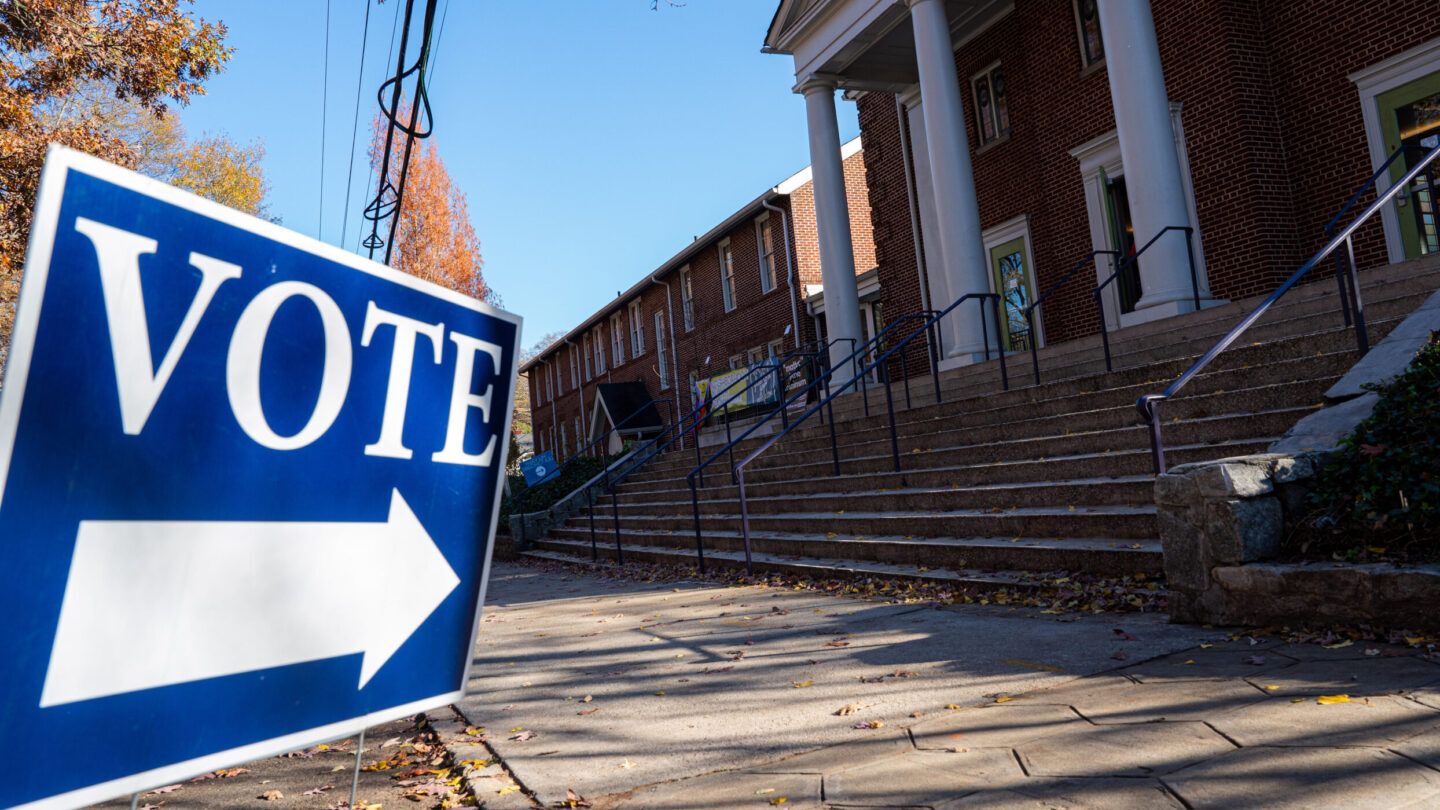Six things to watch in Georgia's primary election on Tuesday

Neighborhood Church in Candler Park was one of many polling places open in Atlanta for a runoff election on Tuesday, December 5, 2023. (Matthew Pearson/WABE)
Another primary? Yup.
Just 10 weeks have passed since Georgia voters went to the polls for the presidential primary. That vote was unsurprisingly clinched by President Joe Biden and former President Donald Trump.
This time, voters will have a chance to weigh in on contested primaries for Congress, the state legislature and high-profile local offices. Several nonpartisan judicial races will also be decided. Turnout during the early vote period has been low, so voters who cast ballots will likely have outsize influence in shaping the outcome of many races.
Voters can request a Democratic, Republican or nonpartisan ballot. Nonpartisan races will also be on the party primary ballots.
It’s a critical election year, and Georgia is at the center of it. Stay in the know with WABE’s 2024 Georgia Elections page, where you can find WABE’s latest election news and podcast episodes, important dates, voting locations, candidate info, results and more.
Here are six things to watch in Georgia’s 2024 primary on Tuesday.
- Trump is not the only player in the Georgia election interference case on the ballot this year. So are the judge and the prosecutor.
Not only is Trump up for election in Georgia as he fights criminal charges for attempting to interfere with the last election result. The presiding judge, Fulton Superior Judge Scott McAfee, and the Fulton County District Attorney Fani Willis, are also facing voters.
“It’s this unprecedented and bizarre confluence of the prosecutor, the judge and one of the defendants all on the ballot,” says veteran Fulton Superior Judge Robert McBurney. “It highlights the tension between wanting to have apolitical judges and yet putting them on ballots.”
McAfee is seeking his first full term since being appointed to fill a vacancy by Republican Gov. Brian Kemp in 2022. Willis became the first Black woman elected Fulton County’s top prosecutor in 2020 and took office just days after Trump’s infamous phone call asking Georgia officials to find him votes.
Attorney and radio host Robert Patillo is challenging McAfee. Attorney Christian Wise Smith is running against Willis. And while the Trump case has drawn attention to the race, including allegations of misconduct against Willis and McAfee’s decision allowing her to remain on the case, the campaign has focused more broadly on the candidates’ approaches to criminal justice.
Fulton County Sheriff Patrick Labat, who oversees the Fulton County Jail where Trump was booked last year and has been plagued by overcrowding and poor conditions, is facing several challengers.
- The abortion debate is shaping a contested race for the Georgia Supreme Court.
Races for seats on the Georgia Supreme Court are usually sleepy affairs. Most incumbents do not draw challengers. But this year, former Democratic U.S. Rep. John Barrow is running against incumbent Justice Andrew Pinson, who was appointed to the bench by Kemp.
Barrow is framing the race around abortion, saying he would rule to restore abortion rights if he is seated on the state’s high court. Georgia’s roughly six-week abortion ban signed by Kemp in 2019 is currently being litigated in state courts and could end up back at the Georgia Supreme Court.
Abortion has animated Supreme Court races in other states, most prominently in Wisconsin. But Barrow has been chastised by the Judicial Qualifications Commission for flouting rules that prevent judges and judicial candidates from committing to how they would rule on issues that could come before the court.
There is also an open seat for the powerful Georgia Court of Appeals, between Tabitha Ponder and Jeff Davis. Some of Ponder’s supporters have challenged Davis’ qualification for the office, arguing that he is not a resident of Georgia.
- Court-ordered redistricting is shaking up metro Atlanta congressional seats.
Metro Atlanta’s congressional districts were all drastically rejiggered following a federal court order late last year. U.S. District Judge Steve Jones found that the Republican-drawn political maps for Congress and the state legislature violated the Voting Rights Act by diluting the power of Black voters.
Most notably, the 6th Congressional District has been redrawn as a majority-Black district rooted in the suburbs west and south of Atlanta. But to cancel out any Democratic gains in Georgia’s Congressional delegation, GOP lawmakers made the 7th district in northeast Atlanta much more friendly to Republicans.
Democratic Rep. Lucy McBath, who came to prominence as a gun control activist, decided to leave the 7th to run in the new 6th and she is facing several opponents vying for that seat.
The 13th district has also been refashioned, though it remains majority Black. It now begins in southern Gwinnett County, runs down through Rockdale, grabs a little bit of Newton and a sliver of DeKalb before hugging the border between Clayton and Henry counties.
For years, the 13th district has been represented by Democrat David Scott. The 78 year-old congressman has served in the U.S. House for more than two decades, but this veteran member has attracted several primary challengers amid questions about Scott’s health and fitness for office.
Scott is not actively campaigning and declined to participate in a local debate. However, he has been a powerful member representing Georgia’s interests in Washington, recently as chair and now ranking member of the House Agriculture Committee, and in March told WABE that he is in good health and continuing to do the people’s work.
- Most state legislative seats are not competitive in the fall. But the primary is different.
During the recent redistricting, Democratic state Sen. Elena Parent was drawn into a new majority-Black district. Parent, who is white, is in line to be Senate minority leader and has racked up endorsements from top Democrats like Stacey Abrams and Raphael Warnock.
Her challenger is Nadine Thomas, a former state lawmaker who is Black. Thomas has, without evidence, accused Parent of suppressing Black voters, photoshopping her into a crowd of Trump supporters storming the U.S. Capitol on Jan. 6.
Republicans also drew the maps to pit several incumbent Democrats against each other, including Atlanta Democrats Saira Draper and Becky Evans.
And in a matchup unrelated to redistricting, Democratic state Sen. Sally Harrell is facing a primary challenge from David Lubin, whose daughter was killed while serving in the Israel Defense Forces in the weeks after Hamas’ Oct. 7 attack.
Lubin is challenging Harrell because she excused herself from voting on a bill codifying a definition of antisemitism, saying it could punish criticism of Israel. This race has become somewhat of a proxy for debates within the Democratic Party over the conflict in Israel and Gaza and how to respond to it.
- In the Atlanta exurbs, a GOP primary showcases Trump’s continuing imprint on the party.
Five Republicans are running for an open, solidly Republican congressional seat that stretches from Atlanta’s southern and western suburbs out to the Alabama border.
Trump has endorsed in this race – former administration official Brian Jack. At a recent debate held at a sporting clays club in Spaulding County, Jack passed out yard signs reading “Trump Endorsed Brian Jack for Congress” and fliers with a picture showing him and Trump.
The other GOP candidates, including former state lawmakers and a police officer, have also embraced Trump. Former Senate Majority Leader Mike Dugan has also highlighted his role in cementing Kemp’s conservative agenda, though Kemp has not endorsed in the race.
A key question: will a Trump endorsement determine who rises above a crowded field?
Another sign of Trump’s hold on the Republican Party base: during a recent Atlanta Press Club debate, the moderator asked for a show of hands to this question: “Who here thinks that President Trump was the rightful winner of the election in Georgia in 2020?” All five raised their hands.
- Postal service disruptions are delaying mail ballots.
At this point, election officials advise against returning your absentee ballot via mail. That’s in part due to ongoing delays originating at the new U.S. Postal Service distribution center in Palmetto.
Cobb County officials say 10 to 15 voters call daily saying they haven’t received their absentee ballot. In Fulton County, some voters are just receiving absentee ballots sent in April. In one case, a husband and wife’s absentee ballots were mailed on the same day, but only the husband has actually received his.
In Fulton, only about 34% of requested absentee ballots have been returned as of Wednesday. In Cobb it’s about 44% and in DeKalb, 37%.
Election officials are urging voters to hand deliver absentee ballots to the local election office or vote in person on Election Day. You can find voting locations and see sample ballots by visiting the WABE Election Hub or the secretary of state’s MyVoter page.
Follow WABE online and on the radio for the latest election updates and results.









